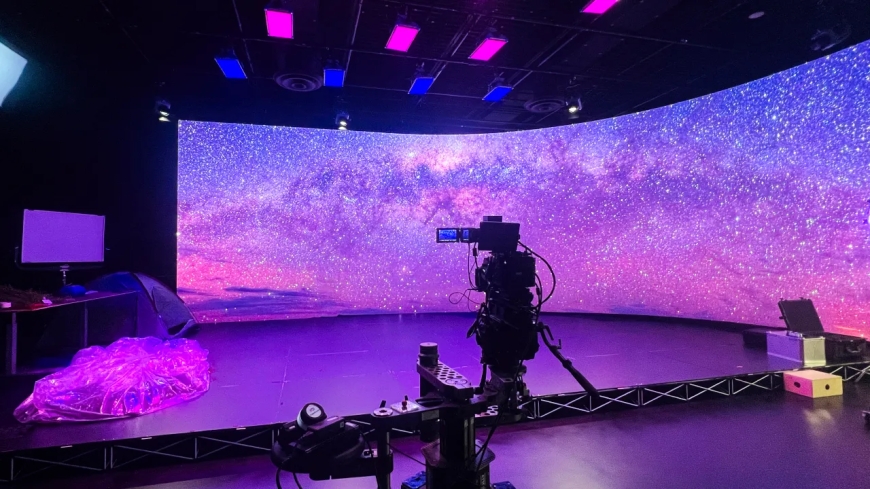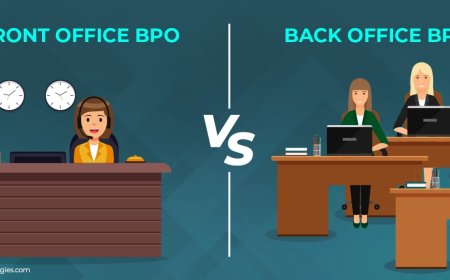The Rise of Virtual Production: Revolutionizing Filmmaking in the Digital Age
The filmmaking industry has undergone a seismic shift in recent years, propelled by advancements in technology that have redefined how stories are told on screen.

Introduction
At the forefront of this transformation is virtual production, a groundbreaking approach that blends physical and digital worlds to create immersive cinematic experiences. Virtual production companies and studios are leading the charge, offering filmmakers innovative tools to craft stunning visuals, reduce production costs, and streamline workflows. Whether you're searching for a virtual production studio near me or exploring the capabilities of a virtual reality production studio, this guest post delves into the evolution, benefits, and future of virtual production in filmmaking.
What is Virtual Production?
Virtual production refers to a suite of filmmaking techniques that integrate real-time computer-generated imagery (CGI), augmented reality (AR), and virtual reality (VR) into the production process. Unlike traditional filmmaking, where post-production often handles visual effects, virtual production allows filmmakers to visualize and interact with digital environments during the shooting phase. This is achieved through technologies like LED walls, game engines (e.g., Unreal Engine), motion capture, and real-time rendering.
The result? Filmmakers can see their vision come to life on set, making real-time decisions about lighting, camera angles, and scene composition without relying heavily on green screens or extensive post-production edits. Virtual production companies are pioneering these techniques, offering specialized services to filmmakers, from indie creators to major studios.
The Role of Virtual Production Companies
Virtual production companies are the backbone of this technological revolution. These specialized firms provide the expertise, equipment, and infrastructure needed to execute complex virtual production workflows. They offer a range of services, including:
-
LED Wall Stages: Massive LED screens that display real-time digital environments, allowing actors to perform within immersive settings.
-
Real-Time Rendering: Using game engines like Unreal Engine or Unity to generate high-quality visuals instantly.
-
Motion Capture and Performance Capture: Capturing actors' movements and expressions to animate digital characters seamlessly.
-
Virtual Scouting and Previsualization: Creating digital twins of locations or sets for planning and creative decision-making before filming begins.
-
AR/VR Integration: Incorporating augmented and virtual reality to enhance storytelling and audience engagement.
These companies cater to a wide range of industries, from film and television to advertising, gaming, and even live events. By partnering with a virtual production company, filmmakers gain access to cutting-edge tools that streamline production and elevate creative output.
Why Virtual Production is a Game-Changer
The rise of virtual production has transformed filmmaking in several key ways. Here are some of the most significant benefits:
1. Enhanced Creative Control
Virtual production allows directors and cinematographers to visualize scenes in real time, making it easier to experiment with camera angles, lighting, and set design. Unlike traditional green screen setups, where the background is added in post-production, LED walls display the environment during filming, providing instant feedback and reducing guesswork.
2. Cost and Time Efficiency
While the initial investment in virtual production technology can be high, it often leads to significant savings in the long run. By reducing the need for location shooting, physical set construction, and extensive post-production, virtual production streamlines workflows and cuts costs. For example, a scene set in a distant galaxy can be filmed in a virtual production studio near me without the expense of building elaborate physical sets or traveling to exotic locations.
3. Immersive Performances
Actors benefit from performing in realistic digital environments rather than acting against a green screen. This immersion enhances their performances, as they can interact with the environment in a more natural and believable way. For instance, an actor playing a spaceship pilot can see the starry cosmos on an LED wall, making their reactions more authentic.
4. Sustainability
Virtual production is an eco-friendly alternative to traditional filmmaking. By minimizing travel and physical set construction, studios can reduce their carbon footprint. This aligns with the growing demand for sustainable practices in the entertainment industry.
5. Flexibility and Scalability
Virtual production studios offer unparalleled flexibility. Whether you're shooting a small indie film or a blockbuster with sprawling digital worlds, the technology scales to meet the project's needs. Virtual production companies can tailor their services to accommodate budgets of all sizes, making the technology accessible to a broader range of creators.
Finding a Virtual Production Studio Near Me
As virtual production gains popularity, more studios are popping up worldwide, making it easier to find a virtual production studio near me. These studios vary in size and capability, from boutique facilities catering to indie filmmakers to large-scale operations used by Hollywood giants. When searching for a local studio, consider the following factors:
-
Technology and Equipment: Does the studio offer state-of-the-art LED walls, motion capture systems, and real-time rendering capabilities? Ensure the facility is equipped with the tools needed for your project.
-
Expertise: Look for studios with experienced technicians, VFX artists, and production teams who understand the nuances of virtual production.
-
Accessibility: A local studio can save time and travel costs, but dont compromise on quality. Some studios offer remote collaboration tools, allowing you to work with top-tier facilities from anywhere.
-
Portfolio: Review the studios previous projects to gauge their expertise in your genre or style, whether its sci-fi, fantasy, or realistic drama.
-
Cost: Compare pricing models, as some studios charge per day, while others offer package deals for longer projects.
To find a virtual production studio near me, start by searching online directories, industry forums, or platforms like Stage 32, which connect filmmakers with production resources. You can also check social media platforms like X for recommendations or reach out to local film commissions for guidance.
The Role of Virtual Reality Production Studios
While virtual production focuses on blending digital and physical environments for filmmaking, virtual reality production studios specialize in creating fully immersive VR experiences. These studios leverage VR headsets, 360-degree cameras, and spatial audio to craft interactive narratives that place audiences at the heart of the story. However, the line between virtual production and VR production is blurring, as many studios combine both to offer hybrid solutions.
For example, a virtual reality production studio might use virtual production techniques to create a VR film, where actors perform on an LED stage, and the footage is adapted for VR headsets. This convergence of technologies is opening new creative possibilities, from interactive films to virtual concerts and branded experiences.
Case Studies: Virtual Production in Action
To illustrate the impact of virtual production, lets look at a few real-world examples:
1. The Mandalorian (Disney+)
Perhaps the most famous example of virtual production, The Mandalorian used ILMs StageCraft technology, featuring massive LED walls to create the shows iconic Star Wars environments. The production team could see the deserts of Tatooine or the interior of a spaceship in real time, reducing post-production costs and enabling faster decision-making.
2. The Batman (2022)
Director Matt Reeves used virtual production to create Gotham Citys moody, rain-soaked streets. By combining LED walls with practical effects like rain machines, the team achieved a hyper-realistic aesthetic without relying heavily on green screens.
3. Independent Filmmaking
Smaller studios are also embracing virtual production. For example, an indie filmmaker in Los Angeles used a local virtual production studio near me to shoot a sci-fi short film. By renting an LED stage and working with a virtual production company, they created a futuristic cityscape on a modest budget, proving that the technology is accessible to creators at all levels.
Challenges and Considerations
While virtual production offers numerous advantages, its not without challenges. The high upfront cost of equipment and studio space can be a barrier for smaller productions. Additionally, the learning curve for mastering game engines and real-time rendering requires skilled technicians and artists. However, as the technology becomes more widespread, costs are decreasing, and training programs are making virtual production more accessible.
Another consideration is creative dependency. Over-reliance on digital environments could lead to a homogenized aesthetic if filmmakers lean too heavily on pre-built assets. To avoid this, virtual production companies encourage customization, ensuring each project has a unique visual identity.
The Future of Virtual Production
The future of virtual production is bright, with advancements in AI, machine learning, and real-time rendering poised to push the boundaries further. Here are some trends to watch:
-
AI-Driven Environments: AI tools will enable virtual production studios to generate dynamic, responsive digital worlds that adapt to actors movements in real time.
-
Cloud-Based Collaboration: Cloud technology will allow global teams to collaborate seamlessly, making it easier to work with a virtual production studio near me or across continents.
-
Expanded Accessibility: As costs decrease, more filmmakers, including students and independents, will gain access to virtual production tools, democratizing the industry.
-
Hybrid Storytelling: The integration of virtual production with VR and AR will create new forms of storytelling, such as interactive films and immersive live events.
Conclusion
Virtual production is revolutionizing the way films are made, offering filmmakers unprecedented creative control, cost savings, and sustainability. Virtual production companies and studios are at the heart of this transformation, providing the tools and expertise needed to bring bold visions to life. Whether youre searching for a virtual production studio near me or exploring the immersive possibilities of a virtual reality production studio, now is the time to embrace this technology. As virtual production continues to evolve, it promises to redefine storytelling, making it more dynamic, inclusive, and visually spectacular than ever before.
For filmmakers looking to dive into virtual production, start by researching local studios, connecting with virtual production companies, and experimenting with tools like Unreal Engine. The future of filmmaking is here, and its virtual.







































